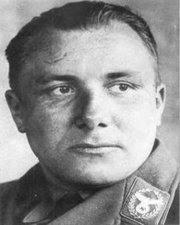Martin Bormann
|
|
Martin_Bormann_02.jpg
Martin Bormann (June 17, 1900 – May 2, 1945) was a prominent Nazi who became head of the Party Chancellery (Parteikanzlei) and Private Secretary to Adolf Hitler. One biographer describes him as having "the chin of a run-to-seed boxer".
Born in Wegeleben (near Halberstadt), Germany the son of a post office employee, Bormann dropped out of school to work on a farm in Mecklenburg. After serving briefly at the end of WWI, Bormann joined the Freikorps in Mecklenburg.
In March 1924 he received a one-year sentence as an accomplice to his friend Rudolf Höß (the later commandant of Auschwitz) in the brutal murder of Walther Kadow (who may have 'betrayed' Leo Schlageter to the French in the Ruhr).
After his release he joined the NSDAP in Thuringia and, despite an apparent lack of skill and a coarse and brutal manner, became its regional press officer and later business manager in 1928. In October 1933 he became a Reichsleiter of the NSDAP and in November a member of the Reichstag. From July 1933 until 1941 Bormann was personal secretary to Rudolf Hess.
The flight of Rudolf Hess to Britain allowed Bormann to become head of the Parteikanzlei in May 1941, and he proved himself a master of political infighting. He developed and administered the Adolf Hitler Endowment Fund of German Industry, a huge fund of 'voluntary' contributions by successful business entrepreneurs to the Führer, which Bormann then reallocated as gifts to almost all the top Party functionaries. In addition to administering Hitler's personal finances, Bormann took charge of all Hitler's paperwork and appointments. Bormann was reported to virtually never leave Hitler's side, mainly in an effort to maintain constant influence on the Führer. A compendium of Borman's notes written during the war was published in 1951 as Hitler's Table Talk, Hitler's secret wartime dinner conversations. Hitler came to have complete trust in Bormann and the view of reality that he presented. During a meeting the Führer was said to have screamed, "To win this war, I need Bormann!" Shortly after Hess' apparent defection, in order to curry even more favor with the Führer, Borman gave Hitler a German shepherd bitch named "Blondi", which was to become Hitler's most famous pet.
At the end of the war, after the suicide of Hitler, Bormann left the Führerbunker in Berlin on April 30 1945, along with SS doctor Ludwig Stumpfegger. Neither was ever seen alive again. For many years it was believed that he may have escaped, leading to much speculation concerning his whereabouts. However, a skeleton identified by dental records as Bormann's was discovered in West Berlin in 1972. In 1999 a DNA test confirmed the identification. At first it had been thought that he was killed by Soviet troops not long after leaving the bunker. If so, he would have been the only top Nazi leader (the others being Adolf Hitler, Heinrich Himmler, Joseph Goebbels and Hermann Göring) killed by enemy fire; the other four committed suicide. But the presence of glass fragments in the teeth suggest that Bormann, too, probably killed himself with cyanide.
In the absence of any proof of his demise, Bormann was tried in absentia at Nuremberg in October 1946 and sentenced to death. His court-appointed defense attorney used the unusual and unsuccessful defense that Bormann could not be convicted because he was already dead. Periodic alleged sightings of Bormann occurred globally for two decades, particularly in Europe, Paraguay and the South American continent. Rumors persisted that Bormann unsuccessfully had plastic surgery while on the run and it had spoiled his face.
The book Bormann: Nazi in Exile was published in 1982 by Knopf (and can be found in PDF format at http://www.spitfirelist.com/). The book details Bormann's supposed postwar activities and his investment of Nazi flight capital into 750 major international corporations.
He was married to Gerda Buch (daughter of the Supreme Party Judge, Walter Buch) and had ten children.
Related articles
fr:Martin Bormann he:מרטין בורמן nl:Martin Bormann ja:マルティン・ボルマン pl:Martin Bormann sv:Martin Bormann

